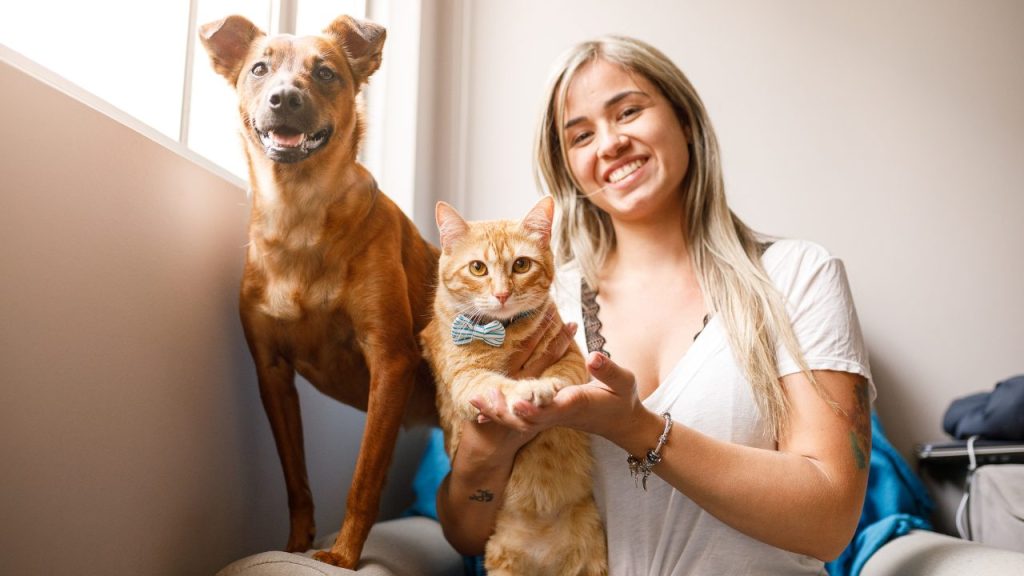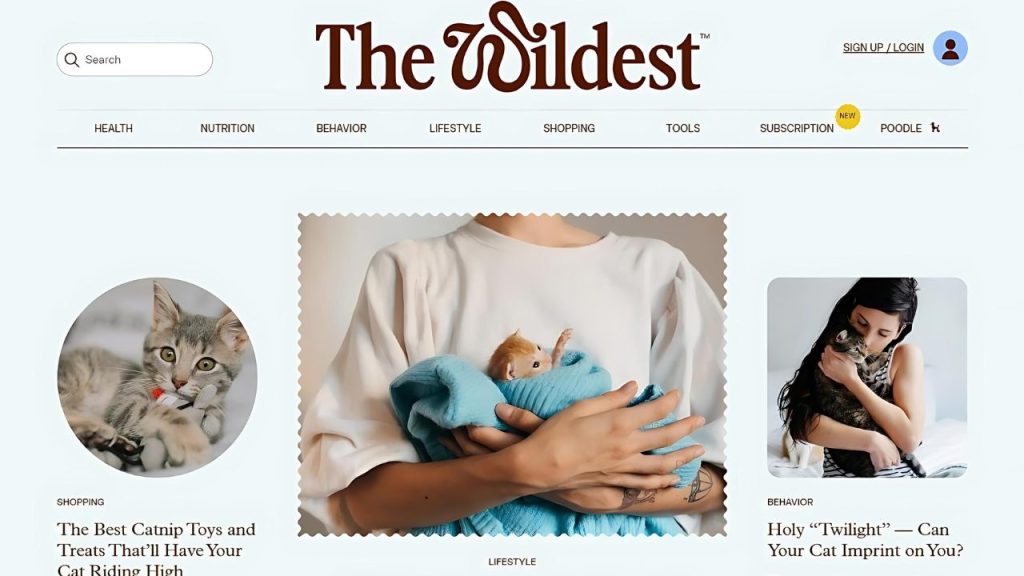Are you passionate about pets and looking for a way to turn that love into a profitable venture? Starting a pet blog could be the perfect opportunity for you. In today’s digital age, pet owners are constantly seeking information, advice, and product recommendations for their beloved companions.
With Americans spending an average of $1,201 annually on dogs and $687 on cats, the pet industry offers a wealth of potential for bloggers.
From pet food and healthcare to grooming and accessories, there’s no shortage of topics to explore. By creating a pet blog, you can tap into this lucrative market while sharing your expertise and connecting with fellow animal enthusiasts.
Why Pet Blogging is a Lucrative Niche

Pet blogging has emerged as an incredibly lucrative niche in recent years, thanks to the ever-growing passion and spending habits of pet owners. According to recent figures, pet lovers in the US spend an average of $1,201 per year on dogs and $687 per year on cats.
This substantial investment in furry companions creates a vast array of opportunities for pet bloggers to monetize their content and build thriving online businesses.
Multiple Revenue Streams
One of the key reasons pet blogging is so profitable is the diverse range of monetization options available. Successful pet blogs have found numerous ways to generate income, including:
- Affiliate marketing for pet products and services
- Display advertising
- Sponsored content partnerships with pet brands
- Selling digital products or online courses
- Offering coaching or consulting services
This variety of income streams allows pet bloggers to create a stable and potentially lucrative business model.
Engaged and Loyal Audience
Pet owners are known for their deep emotional connection to their animals, which translates into a highly engaged and loyal readership for pet blogs. This passionate audience is eager to consume content that helps them better care for their pets, solve common problems, and discover new products or services.
As a result, pet bloggers can build strong communities around their content, fostering long-term relationships with readers and brands alike.
Endless Content Opportunities
The pet industry is vast and diverse, offering endless possibilities for content creation. From pet health and nutrition to training tips, product reviews, and heartwarming stories, there’s no shortage of topics to explore.
By focusing on a specific niche within the pet world, bloggers can establish themselves as experts in their chosen area, attracting a dedicated following and potentially earning a full-time income from their passion for pets.
Pet Blogging Keywords List
| Keyword | Search Volume |
|---|---|
| pets | 1,220,000 |
| vet near me | 2,240,000 |
| farmer’s dog food | 74,000 |
| emotional support animal | 110,000 |
| emergency vet near me | 673,000 |
| dog training near me | 368,000 |
| dog food | 301,000 |
| bravecto for dogs | 110,000 |
| simparica trio for dogs | 60,500 |
| dog boarding near me | 450,000 |
| royal canin dog food | 135,000 |
| nexgard for dogs | 60,500 |
| best dog food | 74,000 |
| nom nom dog food | 14,800 |
| raw dog food | 90,500 |
| dog bed | 368,000 |
| dog crate | 201,000 |
| apoquel for dogs | 74,000 |
| pet meds | 90,500 |
| dog harness | 201,000 |
The Most Searched Cats Keywords
| Rank | Cats Keywords | Global Search volume | PD(Paid Difficulty) |
|---|---|---|---|
| 1 | Cats | 15000000 | 16 |
| 2 | beautiful cats | 45000 | 11 |
| 3 | hypoallergenic cats | 177000 | 11 |
| 4 | rspca cats | 10000 | 6 |
| 5 | funny cats | 1387500 | 8 |
| 6 | stray cats | 186200 | 4 |
| 7 | declawing cats | 45900 | 93 |
| 8 | cats best | 20500 | 99 |
| 9 | famous cats | 11800 | 1 |
| 10 | reddit cats | 13700 | 0 |
| 11 | exotic cats | 35700 | 5 |
| 12 | hemingway cats | 15100 | 8 |
| 13 | brown cat | 122200 | 1 |
| 14 | feline | 148000 | 5 |
| 15 | cat tower | 122500 | 100 |
| 16 | cat cage | 61800 | 100 |
| 17 | orange tabby | 23000 | 8 |
| 18 | discord kitten | 47100 | 0 |
| 19 | burmese cat | 135400 | 3 |
| 20 | cat vaccinations | 35600 | 57 |
| 21 | torbie cat | 13300 | 1 |
| 22 | cat houses | 166000 | 100 |
| 23 | persian cat | 1128300 | 20 |
| 24 | cat whisperer | 13500 | 63 |
| 25 | gray cat | 39900 | 5 |
| 26 | cat scratch | 148000 | 96 |
| 27 | cat shop | 101900 | 94 |
| 28 | oriental cat | 73600 | 2 |
| 29 | a cat | 61800 | 11 |
| 30 | cat family | 59100 | 2 |
| 31 | shaved cat | 22700 | 32 |
| 32 | kucing bengal | 83600 | 97 |
| 33 | kitten toys | 15400 | 100 |
| 34 | fluffy cat | 75600 | 4 |
| 35 | shorthair cat | 42800 | 11 |
| 36 | cat behavior | 30700 | 16 |
| 37 | meow talk | 3400 | 2 |
| 38 | kinkalow | 50200 | 1 |
| 39 | american curl | 85000 | 2 |
| 40 | money cat | 18200 | 78 |
| 41 | flying cat | 31800 | 21 |
| 42 | domestic cat | 31200 | 6 |
| 43 | bengal cat | 852500 | 5 |
| 44 | cat years | 42900 | 1 |
The Most Searched Dog Keywords
| Rank | Dog Keywords | Global Search volume | Cost Per Click(CPC) |
|---|---|---|---|
| 1 | dog | 13891700 | 1.23 |
| 2 | labrador | 9328300 | 0.41 |
| 3 | pitbulls | 8310000 | 0.43 |
| 4 | puppies | 7165000 | 1.19 |
| 5 | golden retriever | 5933300 | 0.25 |
| 6 | boxer | 5000000 | 1.69 |
| 7 | rottweiler | 4924200 | 0.33 |
| 8 | cane corso | 4545000 | 0.10 |
| 9 | border collie | 4090000 | 0.15 |
| 10 | chihuahua | 3966700 | 0.21 |
| 11 | puppy dog | 3781700 | 0.90 |
| 12 | doberman | 3596700 | 0.19 |
| 13 | pomeranian | 3473300 | 0.35 |
| 14 | shih tzu | 3411700 | 0.22 |
| 15 | German Shepherd | 3157500 | 0.52 |
| 16 | husky | 3045000 | 0.57 |
| 17 | beagle | 2892500 | 0.95 |
| 18 | bull dog | 2615000 | 1.51 |
| 19 | american bully | 2573300 | 0.16 |
| 20 | dog barking | 2531700 | 1.15 |
| 21 | pug | 2281700 | 0.25 |
| 22 | dog park | 2035800 | 1.61 |
| 23 | corgi | 1932500 | 0.29 |
| 24 | cocker spaniel | 1898300 | 0.53 |
| 25 | grey hound | 1877500 | 0.36 |
| 26 | Dog breed | 1802500 | 0.41 |
| 27 | labradoodle | 1781700 | 0.51 |
| 28 | bull terrier | 1665000 | 0.16 |
| 29 | goldendoodle | 1610000 | 0.80 |
| 30 | dachshund | 1555000 | 0.55 |
| 31 | pointer | 1527500 | 3.13 |
| 32 | maltipoo | 1527500 | 0.57 |
| 33 | labrador retriever | 1462500 | 0.53 |
| 34 | Poodle | 1383300 | 0.46 |
| 35 | cartoon dog | 1336700 | 1.19 |
| 36 | Great Dane | 1243300 | 0.49 |
| 37 | jack russell | 1220000 | 0.12 |
| 38 | tibetan mastiff | 1155300 | 0.51 |
| 39 | cute dogs | 1133300 | 1.03 |
| 40 | malinois | 1110000 | 0.19 |
| 41 | siberian husky | 1076900 | 0.56 |
| 42 | papillon | 1036700 | 0.38 |
| 43 | schnauzer | 1036700 | 0.36 |
| 44 | boston terrier | 1036700 | 0.27 |
Pet Industry Spending Statistics and Opportunities

The pet industry has experienced remarkable growth in recent years, with spending projections indicating a continued upward trend. This surge presents numerous opportunities for pet bloggers and businesses alike.
Rising Expenditure and Market Size
Pet industry expenditure in the United States reached over $147 billion in 2023, with projections indicating a further increase to $150.6 billion by 2024. This growth is partly attributed to the rise in pet ownership rates, which have climbed from 56% in 1988 to 66% in 2023. Looking further ahead, the pet industry is expected to reach a staggering $261 billion by 2030, presenting a wealth of opportunities for those in the pet blogging space.
Key Spending Categories
Pet food remains the highest-selling product category, with sales of around $58 billion in 2022. This is followed by veterinary care and supplies/OTC medicine at $35.9 billion and $31.5 billion, respectively. For pet bloggers, these figures highlight lucrative niches to focus on, such as pet nutrition, health, and wellness.
Emerging Trends and Opportunities
The pet industry is witnessing several exciting trends that offer potential for growth:
- Pet Services: This segment, particularly animal health and veterinary care, is expected to more than double in size to $112 billion by 2030.
- Pet Technology: Wearable pet technology products are forecast to generate $4.6 billion in revenue by 2027, offering a new and innovative niche for tech-savvy pet bloggers.
- E-commerce: With 86% of pet owners shopping for their pets online, there’s a growing opportunity for affiliate marketing and product reviews in the pet blogging space.
By staying informed about these trends and focusing on high-growth areas, pet bloggers can position themselves to capitalize on the industry’s continued expansion.
How to Choose the Best Pet Blog Topics
Choosing the right topics for your pet blog starts with understanding your audience. Over 66% of American households own pets, creating a vast potential readership. Consider the types of pets your audience owns – dogs, cats, fish, birds, reptiles, or even more exotic pets. Each pet type comes with its own set of challenges and interests, so tailoring your content to specific pet owners can help you create more targeted, engaging posts.
Focus on Practical Advice
Pet owners are always looking for ways to improve their pets’ lives. Offer practical advice and tips on pet care, training, health, and nutrition.
For example, you could write guides on how to travel with pets, tips for introducing a new pet to the family, or advice on managing pet allergies.
These types of posts not only provide value to your readers but also position you as a knowledgeable resource in the pet care community.
Explore Trending Topics
Stay current with the latest trends in the pet industry. This could include new pet products, emerging health concerns, or popular pet-related events. According to Blogging Her Way, roundups of pet-friendly places, products, and services are popular among readers.
You could create lists of the best pet-friendly hotels, review the latest pet gadgets, or discuss upcoming pet-themed celebrations and events.
Share Personal Stories
While informative content is crucial, don’t underestimate the power of personal stories. Blogging Her Way suggests that introducing your own pets and sharing their stories can be a great way to connect with your audience.
These personal anecdotes can make your blog more relatable and help build a stronger connection with your readers. Consider sharing your own experiences with pet ownership, including both the joys and challenges.
Consider Seasonal Content
Pet care needs often change with the seasons, providing ample opportunities for timely content. You could write about keeping pets cool in summer, protecting paws in winter, or managing seasonal allergies
Holiday-themed posts, such as Halloween safety tips for pets or gift guides for pet lovers during the holiday season, can also be highly engaging and shareable. By focusing on these areas, you can create a diverse range of content that appeals to pet owners and keeps them coming back to your blog for more.
Monetizing Your Pet Blog: Ways to Make Money

Affiliate Marketing: A Lucrative Opportunity
One of the most popular ways to monetize a pet blog is through affiliate marketing. This strategy involves promoting pet-related products and services through special links, earning a commission on each sale.
According to Authority Hacker, affiliate marketing is a common and effective monetization method for pet bloggers. By carefully selecting products that align with your audience’s interests and needs, you can create valuable content while generating income.
Display Advertising and Sponsorships
Another effective way to monetize your pet blog is through display advertising and sponsorships. As noted by Authority Hacker, placing ads from networks like AdThrive and Mediavine on your blog can provide a steady stream of income.
Additionally, securing direct sponsorship deals with pet brands can be highly profitable. These partnerships often involve creating sponsored content or featuring products in your posts, providing value to your readers while earning revenue.
Creating and Selling Your Own Products
For pet bloggers looking to diversify their income streams, creating and selling original products can be a game-changer. According to Adam Enfroy, this can include digital products like e-books or online courses on pet-related topics.
Additionally, offering coaching or consulting services to pet owners can be a lucrative option for bloggers with specialized knowledge or expertise. By leveraging your unique insights and experiences, you can create valuable resources that your audience is willing to pay for.
Realistic Income Expectations
While the potential for earning from a pet blog is significant, it’s important to set realistic expectations. Authority Hacker reports that while top pet blogs can earn a full-time income, most pet bloggers don’t reach those levels of earnings.
A more realistic expectation is around $45,000 per year on average. However, with dedication, quality content, and effective promotion strategies, there’s potential for growth and increased earnings over time.
Setting Up Your Pet Blog Website and Domain

Starting a pet blog requires careful planning and execution, especially when it comes to setting up your website and domain. This crucial step lays the foundation for your blogging journey and can significantly impact your success in the pet niche.
Choosing the Right Domain Name
Your domain name is your blog’s online identity, so it’s essential to choose wisely. Select a memorable and relevant domain name that reflects your pet blog niche and is easy for people to find.
Consider incorporating pet-related keywords or your blog’s unique angle to make it stand out. For example, if you’re focusing on dog training, a domain like “pawsitivepuptraining.com” could be both catchy and descriptive.
Selecting a Reliable Web Hosting Provider
Once you have your domain name, you’ll need a place to host your website. Choose a reputable web hosting provider that offers features tailored to bloggers, such as:
- One-click WordPress installation
- Free SSL certificate for security
- 24/7 customer support
- Scalable resources to accommodate your blog’s growth
Many hosting providers also offer a free domain name with their packages, which can be a cost-effective option for new bloggers.
Building Your Website with WordPress
WordPress.org is a popular choice for pet bloggers due to its flexibility and extensive customization options. After installing WordPress, focus on creating an attractive, responsive website design that appeals to pet lovers. Key pages to develop include:
- A welcoming homepage that showcases your latest content
- An engaging “About” page that tells your story and connects with readers
- A user-friendly “Contact” page for inquiries and networking opportunities
- A comprehensive “Privacy Policy” to ensure legal compliance
Optimizing for Search Engines
To help your pet blog gain visibility, implement basic SEO practices from the start. This includes keyword research and on-page optimization to help your content rank well in search engines. Focus on pet-related keywords and topics that your target audience is searching for, and incorporate them naturally into your posts and page titles.
By carefully setting up your pet blog’s website and domain, you’ll create a solid foundation for sharing your passion with fellow pet enthusiasts and potentially monetizing your blog in the future.
Pet Blog Name Ideas
- Sorting by domain score
- Dog Ticker
- Dog Bugs
- Organic Canines
- Doggf
- Dog Privacy
- White Creatures
- Chinese Pets
- Dog Imaging
- Pup Girl
- Doo World
- Dog Pump
- Pet Mailing
- Pet Recruitment
- Doggh
- Dogs Soft
- Pet Gardening
- Horse Pets
- Hard Paws
- Dog Pumps
- Animals Review
- Maternity Dog
- Puppy Hunter
- Pup Consulting
- Scratching Dogs
- Spare Pet
- Canine Body
- Pork Dogs
- Dog Building
- Kennel News
- Puppy Sters
- Canine Eye
- Corporate Pets
- Inside Paws
- Dogs Oil
- Puppyers
- Puppy Fruit
- Pet Chocolate
- Puppy Chicken
- Horsepaws
- Animal Mapping
- Go Creatures
- Red Creatures
- Bulldog Baby
- Dog Blade
- Pet Contacts
- Dog Charters
- Restraint Service
- Terri Group
- Biz Paws
- Waoch
- Fochn
- Dog Lingerie
Optimizing Your Pet Blog for SEO Success
In the competitive world of pet blogging, optimizing your content for search engines is crucial to attract and retain readers. By implementing effective SEO strategies, you can increase your blog’s visibility and drive more traffic to your site. Here are some key tactics to boost your pet blog’s SEO performance:
Conduct Thorough Keyword Research
Start by identifying relevant keywords that pet owners are searching for. Use tools like SEMrush or KWFinder to discover both general terms and long-tail keywords related to pet care, products, and services.
According to a recent study, over 85% of pet owners conduct online research before making purchases, highlighting the importance of ranking well for targeted keywords.
Create High-Quality, Engaging Content
Develop informative and unique content that addresses pet owners’ concerns and preferences. Focus on writing in-depth product guides, how-to articles, and content tailored to specific pet breeds or health issues. As highlighted by pet marketing experts, aim for at least 600 words per post and use eye-catching, SEO-friendly titles that clearly communicate the topic.
Optimize On-Page Elements
Ensure your blog posts are structured for both readers and search engines:
- Use descriptive headings and subheadings (H1, H2, H3) that include relevant keywords
- Write compelling meta descriptions that summarize the post’s content
- Optimize images with descriptive alt text
- Create SEO-friendly URLs that include your target keywords
Build High-Quality Backlinks
According to SEO specialists, building a diverse and high-quality backlink profile is crucial for improving your pet blog’s search rankings. Consider guest blogging, partnering with pet influencers, and engaging in community outreach to earn valuable backlinks from reputable sources in the pet industry.
By implementing these SEO strategies, you can significantly improve your pet blog’s visibility and attract more engaged readers who are passionate about their furry friends.
Promoting Your Pet Blog: Marketing Strategies
Effectively promoting your pet blog is crucial for attracting and retaining a loyal audience. By implementing a diverse range of marketing strategies, you can increase your blog’s visibility, engage with pet owners, and establish yourself as an authority in the pet industry.
Leverage Social Media and User-Generated Content
Social media platforms are invaluable tools for pet bloggers. Actively share your blog content on popular platforms like Instagram, Facebook, and Pinterest to reach a wider audience of pet enthusiasts.
Encourage your followers to share their own pet photos and stories using branded hashtags. This user-generated content not only lends authenticity to your brand but also provides a wealth of engaging material for your social media feeds.
Optimize for Search Engines
To improve your blog’s visibility in search results, focus on creating content around specific, low-competition keywords relevant to your niche. Incorporate these keywords naturally into your blog posts, meta descriptions, and headers. Regularly updating your most popular posts can help maintain their relevance and search engine rankings.
Engage with Your Community
Build relationships with your readers and fellow pet enthusiasts by actively participating in online communities and forums related to your niche. Consider hosting pet-friendly events in your local community, such as dog walks or pet photo contests, to connect with your audience in person and generate content for your blog.
Collaborate and Network
Guest posting on other relevant pet blogs can help you reach new audiences and build valuable backlinks to your site. Additionally, collaborating with pet influencers or partnering with complementary businesses in the pet industry can expand your reach and introduce your blog to potential new readers.
By implementing these strategies consistently and creatively, you can effectively promote your pet blog and grow your audience of passionate pet owners.
Pet Blogging Tools and Resources You Need
To successfully launch and grow your pet blog, you’ll need a variety of tools and resources at your disposal. Let’s explore some essential items that can help you create engaging content, manage your online presence, and monetize your blog effectively.
Content Creation and Management
Creating high-quality content is the foundation of any successful pet blog. Tools like Grammarly and Hemingway Editor can help improve your writing quality and efficiency. For collaborative work and easy access to your drafts, consider using Google Docs.
These tools ensure your pet-related articles are polished and professional. To manage your blog effectively, a reliable web hosting service is crucial. Platforms like Bluehost or Dreamhost offer easy WordPress integration, allowing you to set up your pet blog quickly and customize its design using free themes and plugins.
Social Media and Audience Engagement
Engaging with your audience is key to growing your pet blog. Social media management platforms such as Hootsuite, Buffer, and Sprout Social can streamline your posting, scheduling, and analytics processes across various social networks. These tools help you maintain a consistent online presence and interact with your pet-loving followers effectively.
SEO and Analytics
To improve your blog’s visibility and rankings, SEO tools are indispensable. Google Analytics and Google Search Console provide valuable insights into your blog’s performance and help you optimize your content for search engines. Additionally, plugins like Yoast SEO can guide you in optimizing individual blog posts for better search visibility.
Visual Content Creation
Engaging visuals are crucial for pet blogs. Graphic design tools like Canva and photo editing software like Photoshop can help you create eye-catching images and infographics. For video content, consider using editing apps like Animoto to produce professional-looking pet videos that resonate with your audience.
Monetization Tools
As your pet blog grows, you’ll want to explore monetization options. Email marketing platforms like Mailchimp can help you build and engage with your subscriber list. For creating and selling online courses about pet care, platforms like Teachable are excellent. Additionally, affiliate marketing tools can help you earn commissions by recommending pet products to your audience.
By leveraging these tools and resources, you’ll be well-equipped to create a successful pet blog that informs, engages, and grows over time.
Conclusion
In conclusion, pet blogging presents a lucrative opportunity for passionate writers to tap into a thriving industry. With pet owners consistently demonstrating their willingness to invest in their animal companions, your blog can serve as a valuable resource and influence purchasing decisions.
By leveraging the pet keywords provided and crafting engaging content, you can establish yourself as an authoritative voice in the pet niche. Remember, success in pet blogging requires dedication, consistency, and a genuine love for animals.
As you embark on this journey, stay current with industry trends and always prioritize the well-being of pets in your content. With perseverance and the right strategy, your pet blog can become a go-to destination for pet owners seeking advice, product recommendations, and entertainment.
Read More : How to Get the Most Searched Keywords on Google in 2025
 Oko Dot All In One Technology Solutions By Likhon Hussain
Oko Dot All In One Technology Solutions By Likhon Hussain
